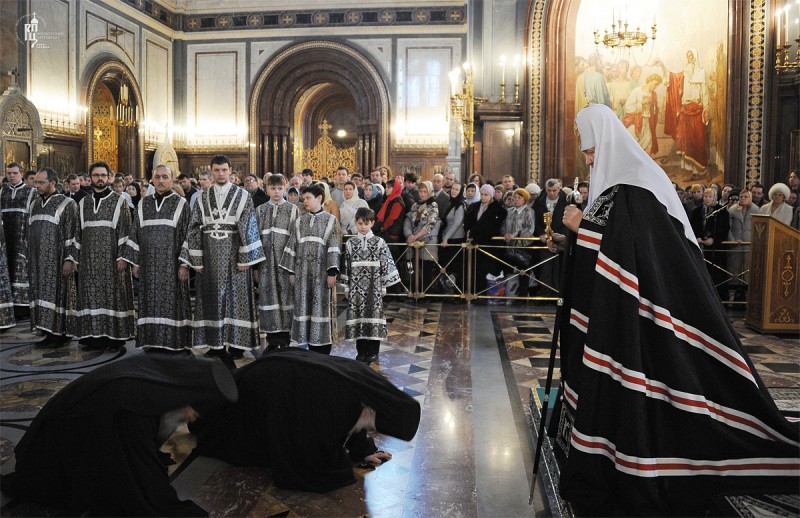For if ye forgive men their trespasses, your heavenly Father will also forgive you: But if ye forgive not men their trespasses, neither will your Father forgive your trespasses. Moreover when ye fast, be not, as the hypocrites, of a sad countenance: for they disfigure their faces, that they may appear unto men to fast. Verily I say unto you, They have their reward. But thou, when thou fastest, anoint thine head, and wash thy face; That thou appear not unto men to fast, but unto thy Father Which is in secret: and thy Father, Which seeth in secret, shall reward thee openly. Lay not up for yourselves treasures upon earth, where moth and rust doth corrupt, and where thieves break through and steal: But lay up for yourselves treasures in heaven, where neither moth nor rust doth corrupt, and where thieves do not break through nor steal: For where your treasure is, there will your heart be also (Matthew 6:14-21).
In the Name of the Father, and of the Son, and of the Holy Spirit!
Today is a special day and special hour, when we ask forgiveness of one another. This wonderful ecclesiastical custom, which has come down to us from deepest antiquity, helps us to understand something very important that relates to our real, everyday lives.
Everyone passes through conflicts and afflictions; everyone has misunderstandings with those around him, whether in the family, at work, or among friends. One way or another, conflicts are always present in our lives. Conflicts are connected with what we call unhappiness, because they often develop into arguments that are accompanied by hatred and anger, sometimes leading people to extremes. We know that divisions between very close people – between husband and wife, between children and parents – can come about as the result of conflicts. Division can sometimes also destroy the unity of nation and society, including when the nation faces the need to solve tasks of historic importance. What if we look to the past, including to our country’s past? How often, due to an inability to make peace and get out of conflict, has our country lost a very great deal, and sometimes almost everything! Does there exist any kind of recipe, any kind of absolutely authoritative testimony, for how to overcome conflicts?
Today during the Divine Liturgy the readings were from the Epistle of the Apostle Paul to the Romans and the Gospel according to Matthew. We find particular clear testimony regarding this matter in the passage we read from the Gospel according to Matthew – clear and simple Divine words of enormous power: For if ye forgive men their trespasses, your heavenly Father will also forgive you (Matthew 6:14).
There can be no happiness without God’s forgiveness. Everyone has sins, weaknesses, and vices. Like physical filth that burdens our body, they burden our spiritual body: our soul. And there is no other means for casting off the weighty filth of sin than by forgiving our neighbors their trespasses. Forgiveness is a great power; it is the attainment of God’s goodwill; it is the overcoming of human conflicts. This great Divine mercy has been imprinted upon the Church’s Tradition, which to the present day proposes that everyone entering the arena of Great Lent – everyone who recognizes his sinfulness, who desires to cleanse his soul of all defilement, and who desires to overcome the burden of conflicts and quarrels – forgive people their trespasses.
These Divine words require our response. We cannot pretend that we do not know or hear them. We can respond in various ways. We can respond to this Divine call joyfully, recognizing its profound wisdom and vital force, and act accordingly. We can forgive those close to us, those who have wounded us, those who have heightened estrangement between our neighbors and us, who have caused us hurt. We can forgive unconditionally, for the Lord does not speak of any conditions. But one might be ashamed to approach someone to ask his forgiveness. This uneasiness comes largely from our pride, from our habit of always considering ourselves to be right, from our habit of judging others from the height of our authority and position, regardless of whether or not we possess real authority.
In a sense, Forgiveness Sunday is a determinate of whether we are willing and able to hear God’s voice and to act according to His commandments. We have gathered today in church to ask forgiveness of one another; when we go home, let us ask forgiveness of our family and friends, especially of those with whom we are at enmity. If we are on good terms with someone, then the Rite of Forgiveness becomes a kind of beautiful custom. People who have not quarreled ask forgiveness of one another with a smile, knowing that they have done nothing bad to one another. But where there is real conflict, real quarreling, where our self-love has been piqued, where we see injustice on the part of our neighbors – oh, how hard it can be to get past ourselves, to bow our knee before someone we believe to be the offender, and to ask forgiveness of him!
Therefore God’s words require our courageous response; they require inner strength. Many people who think of themselves as strong are incapable of taking such a step. Today the Church proposes that everyone – both strong and weak, innocent and guilty – make peace with one another and restore the kind of relations that bring joy, repose, and peace. It is no coincidence that Great Lent begins with the Rite of Forgiveness. If we are incapable of asking forgiveness of one another with sincerity and purity of heart, then it is unlikely that we will be capable of spending the Holy Forty Days in a manner profitable for our souls. Recognizing the importance of the present moment, let us ask of the Lord strength for sincere and heartfelt forgiveness; and let us pray that, by means of this supremely purifying act, we might enter the arena of Great Lent in saving fashion.
I recognize that, as Patriarch, I too can offend someone in word or perhaps by inattentiveness, since many people await the Patriarch’s attention, but there is not always enough strength, and sometimes even understanding, to do what is right. Everyone bears the mark of imperfection and I fully recognize that my words and actions may not always please everyone. Today, admitting this blame before many, I ask forgiveness of you all. Fathers, brothers, and sisters, bless and forgive me!
Spoken on February 26, 2012, at the Cathedral of Christ the Savior in Moscow following Vespers.
Translated from the Russian.
You might also like:
How to Forgive and How Not to Forgive
Forgiveness and Reconciliation: What is the Difference?




















